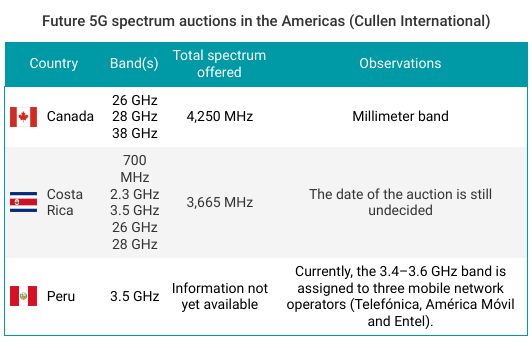Chile and the Dominican Republic have ongoing spectrum auctions.
On 21 March, the Chilean regulator, Subtel, opened the auction of the 3.5 GHz band, offering 50 MHz in total. Claro and Entel submitted bids. The regulator expects to award up to five spectrum licences. The spectrum must be used to install and operate high-speed 5G networks.
Licences will be awarded to the bidders that achieve the highest score in the evaluation of their technical projects. The score is based on network deployment time, the population served, coverage and new infrastructure to be installed. There will be a tender process if two or more applications achieve the same score.
In the Dominican Republic, 250 MHz of spectrum is being offered in the 700 MHz, 2.3 GHz and 3.5 GHz bands. The spectrum must be used for the development of high-speed 5G networks and to support universal service.
The auction was originally scheduled for March 2024 but was postponed to May 2024.
Elsewhere in the region, Canada, Costa Rica and Peru have proposed to hold spectrum auctions in 2024, with regulators aiming to drive the development of 5G networks.

To access the full benchmark, please click on “Access the full content” - or on “Request Access”, in case you are not subscribed to our Americas Spectrum service.
more news
25 February 26
Protection of minors: overview of national initiatives on banning access to social media
Our latest benchmark shows that an increasing number of European countries are discussing a potential social media ban on children.
23 February 26
The DNA explained: universal service to serve the same goals under a revised approach
Cullen International is issuing a series of analyses on different aspects of the Digital Networks Act (DNA) proposal. This report covers universal service.
20 February 26
Revised Cybersecurity Act (CSA2) - Changes to the EU cybersecurity certification framework
Cullen International published an analysis of the proposed changes to the EU cybersecurity certification framework under the draft Cybersecurity Act 2 (CSA2) delivered by the European Commission on 20 January 2026.